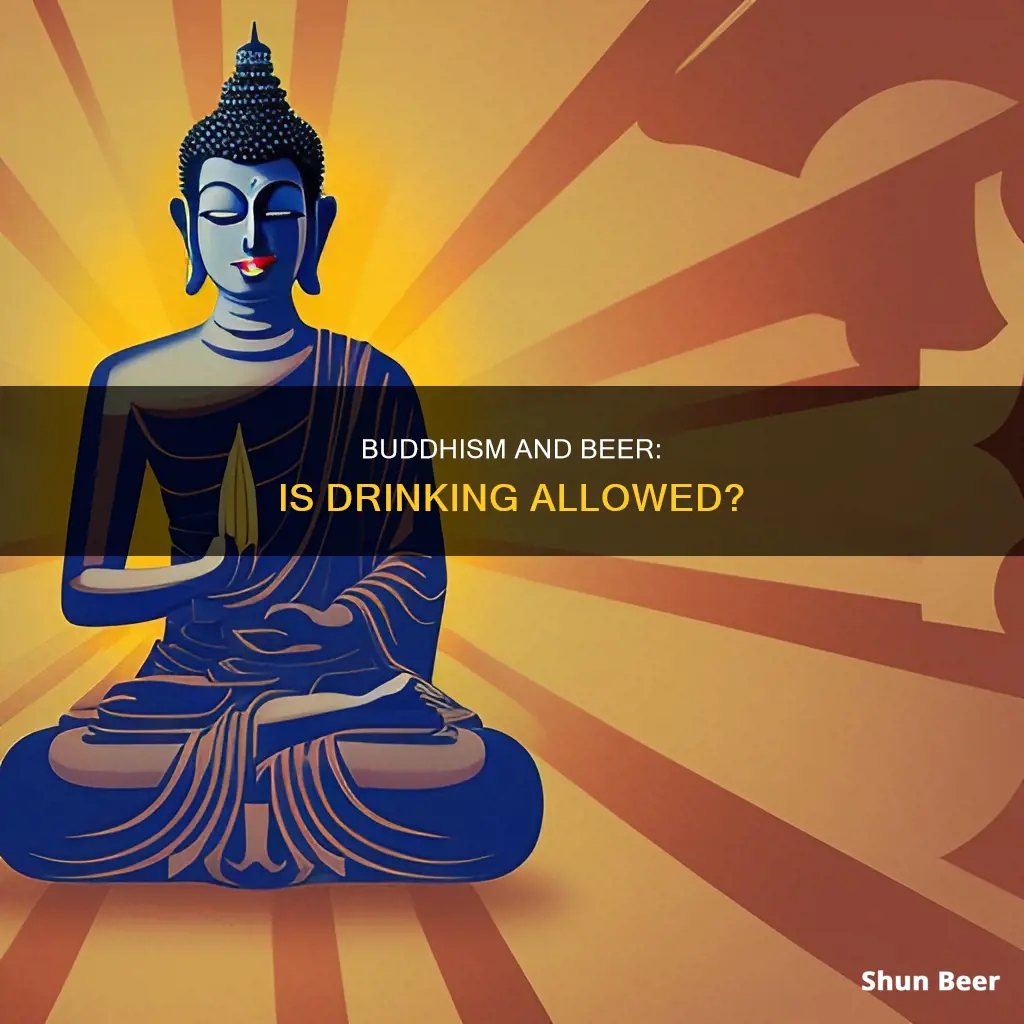
The consumption of alcohol by Buddhists is a controversial topic, with varying interpretations of the fifth Buddhist precept, which states that one should abstain from fermented and distilled intoxicants which are the basis for heedlessness.
Some Buddhists interpret this as a clear prohibition of drinking alcohol, with the Buddha himself teaching that alcohol is a poison that clouds the clarity of the mind. However, others argue that the precept is not a strict rule, but rather a guide to help Buddhists see clearly what creates unwholesome karma.
Some Buddhist traditions, such as Vajrayana Buddhism, incorporate alcohol into their rituals, viewing it as a tool to loosen the subtle clinging of the ego. In these contexts, alcohol is not considered an indulgence but rather a means to enrich one's practice by directly confronting negativity.
Ultimately, the decision to drink or not to drink alcohol as a Buddhist seems to depend on individual interpretation and spiritual maturity. While some Buddhists may choose to abstain completely, others may consume alcohol in moderation, being mindful of its effects on their mind and body.
| Characteristics | Values |
|---|---|
| Monastic rules | Monks and nuns must abstain from alcohol. |
| The fifth precept | "I undertake the training rule to abstain from fermented and distilled intoxicants which are the basis for heedlessness." |
| Interpretations of the fifth precept | Some interpret this as a ban on alcohol, others as a warning against drinking to excess. |
| Mindful drinking | Some Buddhists practise drinking mindfully, using alcohol to loosen the subtle clinging of ego. |
What You'll Learn
- Drinking alcohol is inconsistent with a Buddhist's quest to understand and develop the mind
- The Buddha taught that alcohol is a poison that clouds the inherent clarity of the mind
- The fifth Buddhist precept is a vow to abstain from intoxicants that induce a state of carelessness
- The Vajrayana tradition practices mindful drinking
- Some Buddhists believe that drinking in moderation is acceptable

Drinking alcohol is inconsistent with a Buddhist's quest to understand and develop the mind
The Fifth Precept of Buddhism, as translated from the Pali Canon, is "I undertake the training rule to abstain from fermented and distilled intoxicants which are the basis for heedlessness." The Buddha taught that alcohol is a poison that clouds the inherent clarity of the mind. Buddhists regard the mind as precious and work hard to master it through meditation.
The Fifth Precept is interpreted differently by the two main traditions of Buddhism: Theravada and Mahayana.
Theravada Buddhism
Bhikkhu Bodhi explains that the Fifth Precept can be translated from the Pali to prohibit "fermented and distilled liquors which are intoxicants" or "fermented and distilled liquors and other intoxicants." The purpose of the precept is "to prevent heedlessness caused by the taking of intoxicating substances."
Violating the precept requires an intoxicant, an intention to take an intoxicant, the activity of ingesting the intoxicant, and the actual ingestion of the intoxicant. Theravada Buddhism considers the Fifth Precept to be a clear prohibition of drinking.
Mahayana Buddhism
For the most part, Mahayana Buddhists follow the precepts as explained in the Mahayana Brahmajala (Brahma Net) Sutra. Drinking liquor is a "minor" offence, but selling it is a major breach of the precepts. The meaning of "intoxicant" is broadened to include anything that distracts followers from the path, not just alcohol and drugs.
The Middle Way
Some Buddhists believe that alcohol is acceptable if used in moderation, justifying this in terms of the Buddha's preaching of the 'Middle Way' philosophy. However, the Buddha was against any form of alcohol consumption, even in moderation, because of the effect it has on the mind.
Mindfulness
Mindfulness is central to Buddhist philosophy. This concept requires a constant awareness of changes occurring in the mind and body. Alcohol distorts the mind and makes it impossible to practice this tenet.
Karma
Karma is another Buddhist teaching inconsistent with the use of alcohol. The Buddha taught that each individual must be responsible for their own Karma. Alcohol tends to encourage irresponsibility. It is possible to generate much negative karma while under the influence of alcohol.
Letting Go of Attachments
The Buddha taught that true happiness was to be found in letting go of attachments. Many people are deeply attached to the feelings they experience when drinking alcohol. Through meditation, it is possible to let go of this attachment. Buddhist meditation has been successful in treating alcoholism.
Can Passengers Drink Beer in Virginia?
You may want to see also

The Buddha taught that alcohol is a poison that clouds the inherent clarity of the mind
The consumption of alcohol is addressed in the Fifth Precept of Buddhism, which is "I undertake the training rule to abstain from fermented and distilled intoxicants which are the basis for heedlessness." The interpretation of this precept varies between different schools of Buddhism, such as Theravada and Mahayana.
In Theravada Buddhism, the Fifth Precept is seen as a clear prohibition against drinking alcohol. According to Bhikkhu Bodhi, violating the precept requires the presence of an intoxicant, the intention to ingest it, the act of ingestion, and the actual ingestion. However, consuming alcohol unknowingly or as part of medication is not considered a violation.
Mahayana Buddhists, on the other hand, may have a more flexible interpretation of the Fifth Precept. While drinking liquor is considered a "minor" offense, selling it is seen as a major breach. The definition of "intoxicant" is also broadened to include anything that distracts an individual from the path, such as coffee, tea, or even food. The decision to abstain from alcohol entirely or drink in moderation is left to the individual's spiritual maturity and self-honesty.
The practice of Vajrayana or Tantric Buddhism involves drinking alcohol and eating meat as part of an elaborate group ritual called a vajra feast. This ritual is meant to transform confusion into wisdom and find the sacred within the profane. However, it is important to note that the use of alcohol in this context is not for indulgence or entertainment but as a tool for spiritual transformation.
Ultimately, the interpretation of the Fifth Precept and the consumption of alcohol vary among different Buddhist traditions and individuals. While some may abstain completely, others may practice mindful drinking, where alcohol is viewed as a tool for loosening the ego's subtle clinging rather than a means of escape.
Celiac and Beer: What's Safe to Drink?
You may want to see also

The fifth Buddhist precept is a vow to abstain from intoxicants that induce a state of carelessness
The fifth precept is unique to Buddhism and is regarded as important because drinking alcohol is condemned for the sluggishness and lack of self-control it causes, which might lead to breaking the other precepts. The Buddha taught that alcohol is a poison that clouds the inherent clarity of the mind, and intoxication can lead to loss of wealth, increased conflict, susceptibility to illness, reputational damage, indecent exposure, and weakened insight.
However, some Buddhist traditions, such as Vajrayana Buddhism, practice "mindful drinking," where alcohol is viewed as a tool for loosening the subtle clinging of the ego rather than as a conventional escape. In these traditions, social drinking or having a glass of wine or beer is considered okay as long as one remains mindful of oneself and others and does not enter a state of clouding the body or mind.
Ultimately, the fifth precept is about cultivating mindfulness and wise intention. Abstaining from intoxicants can reveal the power of renunciation, enhance mental clarity, and strengthen willpower. It is a strategy for long-term happiness and personal maturation, relying on increasing self-understanding, developing compassion, and cultivating personal strengths.
Beer and Colonoscopy: Drinking Timeline for the Procedure
You may want to see also

The Vajrayana tradition practices mindful drinking
However, the Tibetan Vajrayana tradition, as taught at Shambhala Mountain Center in Colorado, takes a different approach. Acharya Bill McKeever, a resident teacher at Shambhala Mountain, explains that drinking alcohol is considered an advanced practice. Once a meditator has developed basic Buddhist discipline and adopted the intention to dedicate their life to benefiting others, they can incorporate Vajrayana teachings, which re-evaluate the simple prohibitions outlined in the traditional Buddhist sutras.
In this context, a dangerous substance like alcohol is viewed not as an escape, but as a tool to loosen the subtle clinging of the ego. McKeever explains that, in the right circumstances, a small amount of alcohol can help a person relax and appreciate their situation. This approach has been used for centuries in Kagyü lineage monasteries in Tibet, and was brought to the West by Chögyam Trungpa Rinpoche when he fled Tibet during the Chinese invasion.
At Shambhala Mountain, students are given a lesson in mindful drinking as part of their training. They are instructed to take three sips of sake and observe the effect on their mind. The goal is to bring full awareness to every sip, savouring the taste and concentrating on the memories and sensations it evokes.
While mindful drinking can be illuminating, it can also be challenging. John Ohm, a resident at Shambhala Mountain and a recovering alcoholic, notes that it can be difficult to know where the line between utility and abuse lies. He cautions that "alcohol is suicide for some people," and that "mindful drinking" can be a dangerous excuse for those struggling with alcohol dependence.
To practise mindful drinking correctly, Vajrayana practitioners must remember the context of the lesson and maintain an open and honest perspective. It is about savouring each sip and being fully present and aware of the effects of alcohol on the mind and body.
Beer and Braces: What You Need to Know
You may want to see also

Some Buddhists believe that drinking in moderation is acceptable
The Fifth Precept of Buddhism, as translated from the Pali Canon, is "I undertake the training rule to abstain from fermented and distilled intoxicants which are the basis for heedlessness." This is interpreted differently by different schools of Buddhism.
Drinking in moderation is acceptable to some Buddhists
In the Vajrayana tradition, monks have historically incorporated alcohol into their esoteric practices. When one of these lamas, Chögyam Trungpa Rinpoche, fled Tibet during the Chinese invasion, he brought his teachings on alcohol to the West. Every other summer, more than 100 people gather at Shambhala Mountain in Colorado to become full-fledged Vajrayana practitioners. During the course of their studies, they are given a lesson in mindful drinking.
The Zen priest and teacher Sozan Miglioli also believes that a little beer or wine is okay, as long as one remains mindful of oneself and others. Zen Buddhists try to understand the spirit of the five precepts rather than just the words. The precepts are guides towards the cessation of suffering, not strict or prescriptive admonitions. They are meant to open our eyes and help us see clearly what creates unwholesome karma.
Some Buddhists believe that the Fifth Precept is not a strict rule but a guideline or warning. They believe that the point is not to get intoxicated, and that intoxication leads to heedlessness. When intoxicated, we do not think clearly and our moral judgments are hampered. So as long as a person is not entering a space of clouding the body or mind, social drinking or having a glass of wine or beer can be okay.
Drinking in moderation is unacceptable to some Buddhists
Other Buddhists believe that drinking in moderation is unacceptable. For example, Theravada Buddhism considers the Fifth Precept to be a clear prohibition of drinking. According to Bhikkhu Bodhi, violating the precept requires an intoxicant, an intention to take an intoxicant, the activity of ingesting the intoxicant, and the actual ingestion of the intoxicant.
Some Buddhists believe that any alcohol is an intoxication of the mind. Even one drop of alcohol can impair one's mindfulness and is therefore unwholesome. Alcohol contradicts the practice of mindfulness, which requires a constant awareness of changes occurring in the mind and body.
The middle way
Some Buddhists adopt a middle way, believing that the question of whether to abstain from alcohol entirely or drink in moderation is an individual one that requires some spiritual maturity and self-honesty.
Drinking Beer While on Naltrexone: What You Need to Know
You may want to see also
Frequently asked questions
The consumption of alcohol is prohibited by the Fifth Precept of Buddhism, which states that Buddhists should "refrain from taking intoxicants". However, there are differing interpretations of this precept, and some Buddhists do drink alcohol in moderation.
The Fifth Precept is a vow to "abstain from taking intoxicants that dull the mind". The exact translation of the precept is a matter of debate, but it is widely understood to refer to alcohol and other drugs.
Alcohol is considered to be inconsistent with Buddhist beliefs as it distorts the mind, which Buddhists regard as precious. The Buddha taught that alcohol is a poison that clouds the inherent clarity of the mind.
Yes, some Buddhists interpret the Fifth Precept as a warning against excessive drinking, rather than a strict prohibition. In the Vajrayana tradition, for example, alcohol is consumed as part of a ritual feast.







